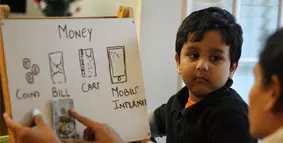
Set Them on a Path Toward a Solid Financial Future
Managing money isn’t easy. Waiting to learn about handling money until you are on your own as an adult makes it even more challenging. Teaching kids about money early on will help them to become more financially independent as they get older. Financial education has been linked to lower debt levels, higher savings, and higher credit scores as children mature into adulthood. Later on in life, that financial education is also positively connected to net worth and investing.
Parents are the primary influence on a child’s future financial well-being because they have many occasions to communicate information, set powerful examples, and involve children in activities that teach them financial skills. Parental involvement in their children’s financial education has long lasting effects.
Different ways children learn about money
One of the biggest ways children learn is by observing. Chances are, you go to work to provide for your family. Your child can see that a relationship exists between work and money. Have a conversation with your child about work and how your earnings influence your purchases, where you live, and how you get to work.
Another great way to teach your children about money is by including them when paying bills or discussing large purchases. Family financial meetings can be a way of teaching children about the financial choices you make and why you make them. Depending on the age of the children, try to put it in terms they understand. The main idea is to teach them the importance of budgets and making choices with your money.
Children learn about money by doing. By having your child actively participate in a trip to the grocery store, they can see how budgeting relates to shopping. You might open a savings account online to provide an opportunity to teach about saving money, especially if they see you are saving as well. At an appropriate time, an outing to your local bank to show them where their account is located and what a bank does can also prompt conversations about money. If your child operates a lemonade stand, has a cookie sale, dog sits, or babysits, use these occasions to teach about earning, spending, saving, and donating.
Children can learn about money by reading with you. A number of children’s books currently on the market teach all about earning, spending, saving, borrowing, and donating. These books provide an easy and spontaneous opportunity for questions and answers. Check your local library for suggestions; you may be able to check out books online with your library card. You may also be able to read books online through other free services.
Children learn about money by playing, particularly if you are playing with them. Board games with play money can be great teachers. Online games provide a fun way to teach about money and start smart money conversations.
Financial education resources for children
The FDIC, the Consumer Financial Protection Bureau (CFPB), and the National Credit Union Administration (NCUA) provide different types of free financial education materials for pre-kindergarten through college students.
The FDIC has a Money Smart curriculum (Money Smart Catalog) with modules written for specific age groups. While targeted toward teachers and schools, parents can use the Money Smart program at home, too. If you don’t know how to start the conversation with your children, check out the children’s books offered as references in many of the modules. These books can be a good way to start a lesson and begin a smart money conversation.
CFPB’s Money As You Grow (consumerfinance.gov) program teaches children how to reach certain age-appropriate financial milestones. The CFPB also offers a list of children’s books that can help open conversations about money.
If having a smart money conversation while you play is more your style, you might visit NCUA Games (mycreditunion.gov). The NCUA offers World of Cents to teach your children about earning, saving, and spending through a match game with coins. Test Your Money Memory is a match game that pairs United States coins and currency with the appropriate president. Hit the Road is a game about earning and spending using a trip across America.
The U.S. Mint (usmint.gov) also has free games and activities for children. From math games to coin scavenger hunts, you can find all sorts of smart money conversation starters.
Having open conversations about money with your children, shopping with them on a budget, reading to them about money, and playing money games will have a lasting effect on their ability to better manage finances in the future.
